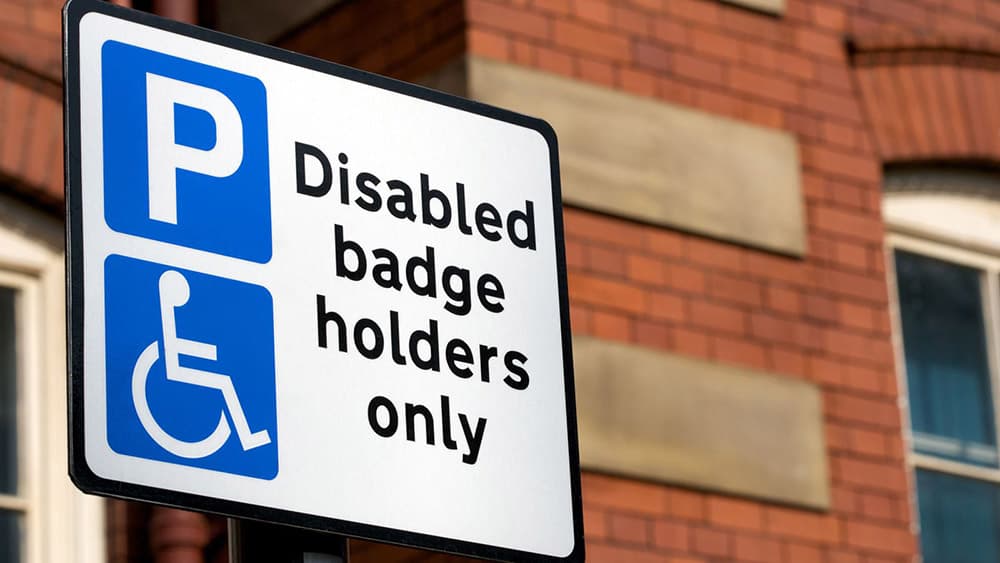Nearly one million Blue Badges issued between 2019-2020, latest figures reveal

The Department for Transport (DfT) has published new statistics about the number of Blue Badges held in England as at 31 March 2020.
Blue Badges are parking badges issued by local authorities to disabled individuals with severe mobility conditions. Having a badge enables disabled people to park in designated parking spaces, which are situated closer to their destination.
Badges can also be issued to organisations who care for and transport people with disabilities. Upon issue, a Blue Badge is valid for a period of up to three years.
For the most recent Blue Badge statistics, DfT obtained data from the Blue Badge Digital Service (BBDS) database.
Traditionally, the Blue Badge scheme has been aimed at disabled people with severe mobility problems. However, in the period covered by the latest Blue Badge figures, DfT introduced new eligibility criteria that enabled people with non-visible – or ‘hidden’ – disabilities to receive a disability parking badge.
Under the scheme extension, people who cannot walk as part of a journey without considerable psychological distress or the risk of serious harm, such as those living with dementia, autism, and anxiety, were able to apply for a Blue Badge. The new criteria came into force on 30 August 2019.
By 31 March 2020, DfT figures show that 2.44 million Blue Badges were held, representing a 6.5 percent increase from March 2019. 4.3 percent of England’s population held a Blue Badge by 31 March 2020.
In addition, 966,000 badges were issued between 1 April 2019 and 31 March 2020, representing a 4.2 percent increase compared to the previous year. This could be due to the extension of the Blue Badge scheme to include people with hidden disabilities.
For prosecutions in the financial year ending 2020, there were 1,429 prosecutions for misuse of Blue Badges, DfT says. This is down by 0.2 percent compared to 2018/19.
However, as COVID-19 became more prominent in England in March 2020 and more people stayed inside to prevent transmission – which was enforceable by law with the first national lockdown – this could mean that less people were travelling, so disabled parking abuse might have been less common.
Although prosecution for the financial year ending 2020 was down by 0.2 percent, a recent survey from Disabled Motoring UK (DMUK) found that a staggering 95.6 percent of participants did not think that local authorities were doing enough to tackle Blue Badge abuse.
The 2020 DMUK Baywatch Campaign asked 777 disabled people about their parking experiences over the past 12 months to shed light on disabled parking abuse throughout the UK.
DMUK said that it was not surprised that 95.6 percent of disabled people said local authorities should do more to tackle disabled parking abuse as from DfT’s annual Blue Badge statistics, every year the number of local authorities prosecuting Blue Badge fraud is “disappointingly low”.
DfT’s statistics also show that for 2019/2020, the regions with the most Blue Badges issued as a proportion (two percent) of their population were the North East, East Midlands and South West. The region with the lowest proportion was London (1.1 percent).
https://thiis.co.uk/nearly-one-million-blue-badges-issued-between-2019-2020-latest-figures-reveal/https://thiis.co.uk/wp-content/uploads/2019/06/blue_badge_extension.jpghttps://thiis.co.uk/wp-content/uploads/2019/06/blue_badge_extension-150x150.jpgGovernment & Local AuthoritiesNewsroomReports & ResearchSector NewsBlue Badge,Blue Badge scheme extension,Blue Badge statistics,Department for Transport,DfT,Disabled Parking,reduced mobilityThe Department for Transport (DfT) has published new statistics about the number of Blue Badges held in England as at 31 March 2020. Blue Badges are parking badges issued by local authorities to disabled individuals with severe mobility conditions. Having a badge enables disabled people to park in designated parking...Sarah SarsbySarah Sarsbysarah@thiis.co.ukEditorTHIIS Magazine

